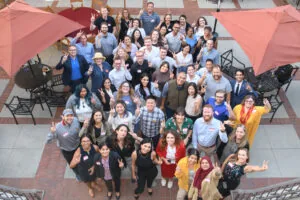Description
In 2020, Los Angeles County made history with an all-women Board of Supervisors elected to lead the largest local legislative body in the nation. This was possible due to a large part played by trailblazers like Gloria Molina, who was the first Latina elected to the Board of Supervisors in 1991 and represented East Los Angeles for 23 years.
With the upcoming elections in sight, Molina discusses the future of Los Angeles, its homeless crisis, the impact of the COVID-19 pandemic and political leadership changes with USC Dornsife Center for the Political Future (CPF) Director Bob Shrum and Co-Director Mike Murphy.
Who Will Benefit
– Those seeking a deeper understanding of Los Angeles’ public safety measures, homeless crisis and impact of the pandemic
– Young voters looking for insights about upcoming local political races, including the 2022 Los Angeles mayoral election
– Those hoping to hear how women candidates have approached and overcome distinct challenges
About Our Featured Faculty
Gloria Molina, fall 2021 fellow at the USC Dornsife Center for the Political Future (CPF), represented the L.A.’s First District on the Los Angeles County Board of Supervisors for more than two decades. Growing up in the Pico Rivera area, she learned that eliminating unfair barriers is the best way to ensure equal opportunity. From founding East L.A.’s Comisión Femeníl Mexicana Nacional to serving in the Carter White House, that idea has driven her lifelong commitment to public service.
In 1982, Molina made history as the first Chicana elected to the California State Assembly. In this role, she combined passionate advocacy with formidable political skill to strengthen communities in the 56th Assembly District and statewide. In 1991, she became the first Latina to join the Los Angeles County Board of Supervisors, where she was known as a fiscal watchdog committed to good government reforms, maintenance of the county’s public health care delivery system and quality-of-life issues — particularly for the one million county residents residing in the unincorporated areas.
Named as one of the Democratic Party’s “10 Rising Stars” by TIME magazine in 1996, Molina served as one of four vice chairs of the Democratic National Committee through 2004. During the 2000 presidential election, Molina was one of 15 top women leaders nationwide to be named as a possible vice-presidential candidate by the White House Project, a non-profit, non-partisan group dedicated to raising awareness of women’s leadership in American politics.
Robert “Bob” Shrum is the director of the USC Center for the Political Future and the Carmen H. and Louis Warschaw Chair in Practical Politics at USC Dornsife. A legendary political strategist, he was described as “the most sought-after consultant in the Democratic Party,” by The Atlantic Monthly. He was the strategist in over 25 winning U.S. Senate campaigns, eight successful campaigns for governor, successful campaigns for mayors in major American cities, and numerous campaigns for Congress and other statewide offices. His numerous clients included Edward Kennedy, Joe Biden, John Glenn, and Barbara Mikulski, David Dinkins and Tom Bradley — and John Kerry and Al Gore in their presidential races. Overseas, his clients included Israeli Prime Minister Ehud Barak, the British Labour Party, the Prime Minister of Ireland, and the Presidents of Colombia and Bolivia.
Mike Murphy is the co-director of the USC Center for the Political Future. Murphy is one of the Republican Party’s most successful political media consultants, having handled strategy and advertising for more than 26 successful gubernatorial and senatorial campaigns. His record in helping Republicans win Democratic states is unmatched by any other GOP consultant. Murphy has been called a “media master” by Fortune magazine, the GOP’s “hottest media consultant” by Newsweek, and the leader of a “new breed” of campaign consultants by Congressional Quarterly. He is a widely known political pundit, appearing frequently on NBC, CNN and NPR. Previously, he served as a regular on the Meet the Press political roundtable and wrote the “Murphy’s Law” column for TIME Magazine.




